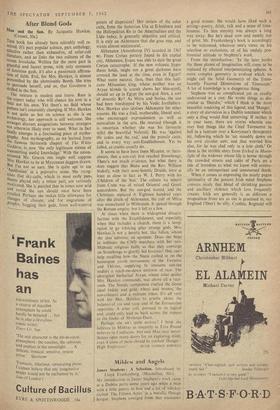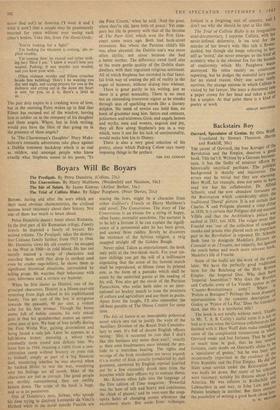Mildew and Angels
James Stephens : A Selection. Introduced by
Lloyd Frankenberg. (Macmillan, 30s.) MY introduction to James Stephens's work came at a Dublin party ,some years ago when a man with a little poetry in him and a lot of whiskey recited 'The Fifteen Acres' in.a metallic Omagh B brogue. Stephens emerged from that encounter a good winner. He would have liked such a setting—poetry, drink, talk and a sense of time- lessness. To him eternity was always a long way away. But he's dead now and mostly out of print. Mr. Frankenberg's book is accordingly to be welcomed, whatever one's views on his selection or exclusions, or of his unduly pro- fessorial attitude to Stephens's work.
From the introduction: 'In the later books the three planes" of imagination will come to.be replaced by ethereal interpenetrating spheres. A more complex geometry is evolved which we might call the Solid Geometry of the Trans- lucently Faceted Dimensions of Timescape.' A lot of knowledge is a dangerous thing.
Stephens was as complicated yet as readily understood as a tree. He wrote things as dis- similar as 'Deirdre,' which I think is the most beautiful rendering of this legend, and 'Hunger,' a story of starvation in a Dublin tenement which only a thug would find unmoving. If neither is to your taste, there are stories wherein one may find things like the Chief Tormentor in hell in a tantrum over a Kerryman's threepenny bit,, following which he 'sat moodily down on his own circular saw; and that worried him also, for he was clad only in a loin cloth.' Or there is the terrible story from Etched in Moon- light of the widower whose life is borne through the crowded streets and cafes of Paris on a tide of boredom to what we know will eventu- ally be an unimportant and unmourned death.
When it comes to expressing the nearly pagan spirituality of the present Irish mind Stephens conveys nicely that blend of shrinking passion and ancillary violence which love frequently creates. Irish sex generally is so different a proposition from sex as she is practised in, say England ('Don't be silly, Cynthia, Reginald will
never find out') or America ('I want it and I want it now') that a couple may be passionately married for years without ever seeing each other's bodies. Take this, from The Demi-Gods:
'You're looking for a fight?'
'I'm looking for whatever is coming,' she re- plied steadily.
'I'm coming then' he roared and (after strik- ing her) 'Here I am."1. knew it wasn't love you wanted, Padraig; it was murder you wanted, and you have your wish. . .
(Then violence recedes and Eileen crouches beside him babbling) 'Don't I be wanting you day and night, and saying prayers for you in the darkness and crying out in the dawn my heart is sore for you, so it is, there's a twist in us. . .
The pair duly expire in a crashing wave of love, but in the morning Patsy wakes up to find that Eileen has escaped out of the window, leaving him to soldier on in the company of his daughter and three angels. Where, but in Irish writing, would you have the likes of that going on in the presence of three angels?
In The Charwoman's Daughter' Mary Make- believe's romantic adventures take place against a Dublin tenement backdrop which is as real as mildew, and amongst people who know exactly what Stephens meant in his poem, 'To
the Four Courts,' when he said, 'And the poor, when they're old, have little of peace.' Yet com- pare her life in poverty with that of the heroine of The Poor Girl, which won the Prix Gon- court some years ago. Both had back-street existences. But where the Parisian child's life was often abysmal, the Dublin one's was more often idyllic; not alone because she had a better mother. The difference owed itself also to the more gentle quality of the Dublin slum- dwellers, with their ingrained religious sentiment. All of which Stephens has recorded in that fanci- ful Irish way of coating the pill of reality in the sugar of humour, without sliding into whimsy.
There is great purity in his writing, just as there is a great sensuality. There is no smut but an abounding irreverent vigour as he streaks through seas of sparkling words like a literary dolphin. No mesh of syntax can hold him, no hook of grammar snag him. Satyrs and centaurs, policemen and widowers, Gods and angels, heroes and myths, men and women, anguish and joy, they all flow along Stephens's pen in a way which, were it not for his lack of sentimentality, would make him kin to Disney.
There is also a very good selection of his poetry, about which Padraig Colum says many imposing things in the preface.
atm PAI COOGAN



































 Previous page
Previous page